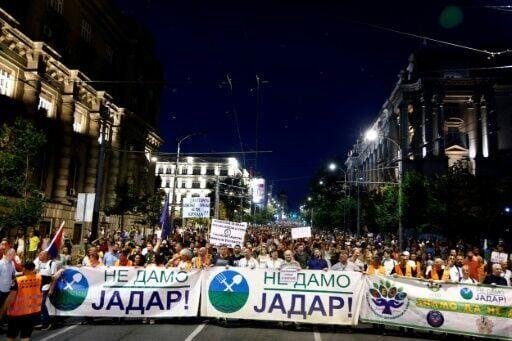Serbia in Uproar: Mass Protests Against Lithium Mine
Thousands Take to Belgrade Streets in Fierce Opposition to Green Energy Project
Serbia’s capital erupted in protest on Saturday as thousands took to the streets to denounce the government’s decision to revive a controversial lithium mine. The project, intended to fuel Europe’s green energy transition, has ignited fierce opposition due to concerns over environmental impact and public health.
Demonstrators clashed with authorities, blocking railway tracks and vowing to escalate protests if the government doesn’t back down.

The ongoing protests against the proposed lithium mine in Serbia took a dramatic turn on Saturday as thousands of demonstrators flooded Belgrade’s streets. The project, backed by Rio Tinto and seen as crucial for Europe’s green energy transition, has ignited a fierce backlash from environmentalists and local communities concerned about potential ecological damage.
Despite government warnings and a heavy police presence, protesters remained undeterred, blocking railway tracks and vowing to intensify their actions if their demands are not met. The government has accused protest leaders of attempting to destabilize the country, while activists insist their focus is solely on environmental protection.
The standoff between the government and protesters highlights the complex challenges of balancing economic development and environmental sustainability. As the situation unfolds, the world is watching to see how Serbia will navigate this critical juncture.
Would you like to add more details about the potential environmental impact of the mine, or perhaps explore the political implications of the protests?
Serbia’s Lithium Mine Protests: A Deeper Dive
Environmental Concerns Fuel Outrage
At the heart of the Serbian protests is a deep-seated fear of the environmental consequences of the lithium mine. Protesters argue that the project poses a significant threat to water resources, biodiversity, and public health. The Jadar Valley, where the mine is proposed, is known for its pristine natural beauty and rich agricultural land. Critics contend that the mining process could contaminate water supplies, leading to long-term health issues for local communities.
Furthermore, the potential for soil erosion, deforestation, and habitat destruction has alarmed environmental activists and local residents alike. They argue that the economic benefits touted by the government do not outweigh the irreparable damage to the environment.
Political Implications and a Divided Nation
The lithium mine project has become a highly politicized issue, deepening divisions within Serbian society. The government, under pressure from the EU to secure critical minerals for its green energy transition, is steadfast in its support for the project. They argue that it will create jobs and boost the economy.
However, the opposition and a growing number of citizens view the project as a sellout to foreign interests and a disregard for the environment. The protests have galvanized a diverse coalition of environmental activists, opposition politicians, and ordinary citizens, demonstrating the power of grassroots mobilization.
The government’s handling of the protests has also drawn criticism. Accusations of heavy-handed tactics and attempts to stifle dissent have further fueled public anger. As the situation escalates, there is growing concern about the potential for further unrest and instability.
The Serbian lithium mine controversy is not isolated. It reflects a broader global challenge of balancing economic growth with environmental protection. The demand for critical minerals like lithium, cobalt, and nickel is soaring as countries transition to renewable energy sources. However, the extraction of these resources often comes with significant environmental and social costs.
The outcome of the Serbian protests could have far-reaching implications for other countries facing similar dilemmas. It highlights the importance of transparent decision-making, public consultation, and stringent environmental regulations in the development of mineral resources.
Would you like to explore the potential economic benefits of the mine, or perhaps discuss the role of international pressure in the conflict?
